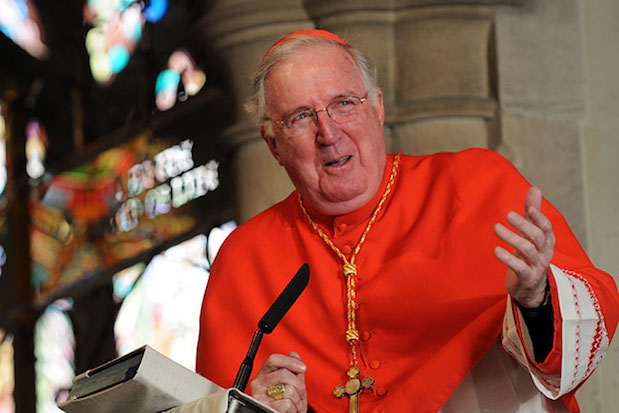The Catholic bishops of England and Wales – and the separate hierarchy for Scotland, for that matter – have long been uncritical, even sycophantic, supporters of the European Union. The question isn’t whether they will try to persuade Catholics to vote to stay in, but how they will go about it – and whether they will succeed.
The campaign is already under way. It has been kicked off by Cardinal Cormac Murphy-O’Connor, the English churchman closest to Pope Francis and a genial fellow who never met a canapé he didn’t like. He has already said…
… though Christian churches will not take position on the referendum vote, Catholics should vote for Europe…
… which sounds awfully like taking a position to me. True, Cardinal Cormac is a retired Archbishop of Westminster (and a vigorous retirement it is, too: lots of ‘those look delicious’, ‘don’t mind if I do’, ‘top of the morning to you, Duchess’ and ‘as I was explaining to the Holy Father…’). He doesn’t speak for the Catholic Church in England and Wales. That’s the job of his successor Cardinal Vincent Nichols, who chooses his words more carefully, lest he say anything interesting. He won’t openly instruct Catholics to vote to remain in the EU but he is just as keen as Cormac that they should do so. As for the Scottish bishops, they’re on record as urging Catholics to take ‘a positive view of the European Union’, so we can guess how they want us to vote.
Will their views carry much weight? Probably not among English-born Catholics. It’s been a long time since the English and Welsh hierarchy’s blather about ‘the common good’ (meaning: vote Labour) swung a single vote.
In Scotland, Catholics have in the past formed a voting bloc and perhaps they still do. Around 60 per cent of Catholics are nationalists, which is remarkable when you consider that the SNP were once their hereditary enemies. The Church has helped encourage that shift. Scottish bishops, priests and teachers have embraced the cod-Celtic imagery of the Nationalists; some prelates display a loyalty to the SNP government that reminds me of bishops in Franco’s Spain. At any rate, they will use any influence they do have to try to block Brexit.
On both sides of the border, the hierarchies are likely to focus on immigrants. Catholic bishops and priests believe that the more migrants we welcome, the better. This view may be based on their reading of the Gospels; at the same time, they’re also well aware that immigrants are propping up their parishes. For their part, immigrants see the clergy as their natural champions – and, come the EU referendum, could respond favourably to a little nudging from the pulpit.
You can make a case that the European Union is inspired by Catholic ideals: two of its founders – Robert Schuman and Alcide De Gasperi – are being considered for sainthood. You can also argue that the European Commission long ago abandoned the Catholic concept of subsidiarity and has become an agent of intolerant secularisation.
Catholics can and should disagree about the entirely non-religious question of Britain’s membership of the EU. Many of the most outspoken Eurosceptic MPs – Iain Duncan Smith, Jacob Rees-Mogg, Edward Leigh, Bill Cash – are practising Catholics. I hope they are aware that, unless someone stops them, their bishops will attempt to ‘deliver’ the votes of Catholics, and especially foreign-born Catholics, for the other side.







Comments